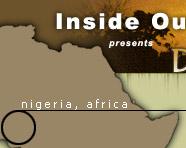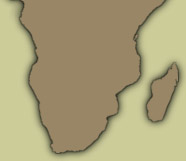|
While the traffic moves at a crawl, the rest of the city seethes with human activity. People leap over highway barriers and race across the six lanes of frozen metal. Off in the distance around campfires people hustle around. Nigerians have a huge amount of energy. For all their application they remain desperately poor. It doesn' t take long to feel a sense of outrage on their behalf. This country pumps as much crude oil as Kuwait, the oil companies pay a hefty royalty to the government on every barrel they pull out of the ground. Most of that money has found its way to Swiss Bank accounts of the various military dictators and government bigwigs who have ruled here for the last few decades. There is no humor in the irony that a place rich in energy can' t provide enough power to keep the streets lit or build roads or provide the most basic services for its people.
The Doctors Without Borders-MSF mission I visited is an hour flight south of Lagos. The team operates in the middle of the Niger River Delta, Nigeria' s oil producing region. The Delta is a place of extraordinary beauty. It is the planet' s largest mangrove swamp, one of the planet' s largest wetlands. It is a place of intricate waterways and architectural forests. Palm trees and Mahogany soar above the bamboo and shorter plants. There is also a fiery red tree - I think the nutmeg - reaching up to the sky. Nothing man made gets up as far although the churches try. Their spires - all of which seem in imminent danger of collapse -- manage to get close to the treetops.
The Delta has been called many things since the Portuguese first explored the area several hundred years ago: the Slave Coast, for obvious reasons, the Oil Rivers, for the not obvious reason that it was the center of the lucrative 19th century trade in palm oil, and the White Man's Graveyard. The last name is particularly evocative. Fevers of all sorts thrive in the mangrove swamps. European explorers were especially vulnerable. The MSF mission in the Delta is aimed at Malaria, the leading cause of death in children under five and in pregnant women. 70 to 80 percent of the population in the region is infected with the parasite that causes the disease. If they manage to survive the first five years of life, people seem to develop a natural immunity to the disease. That' s not the case for people from Europe.
Before I went to the Delta I began a course of prophylaxis. I started taking chloroquin pills two weeks before my arrival. When I got to the MSF compound in Yenegoah, in the Delta, Dr. Chris Lewis asked me what I was taking. I told him. "Won' t do you any good here, mate," he smiled. It seems that the malaria parasite has evolved and now has a resistance to the drug. Lewis put me on a course of super anti-biotics. They were a little rough on the stomach but boy, did I feel great. Every bug that was lurking in me was zapped within hours. If the heat hadn' t been so sapping I might have gone into training for a marathon. I exaggerate, but the pills have worked.
 |  |
|
|





